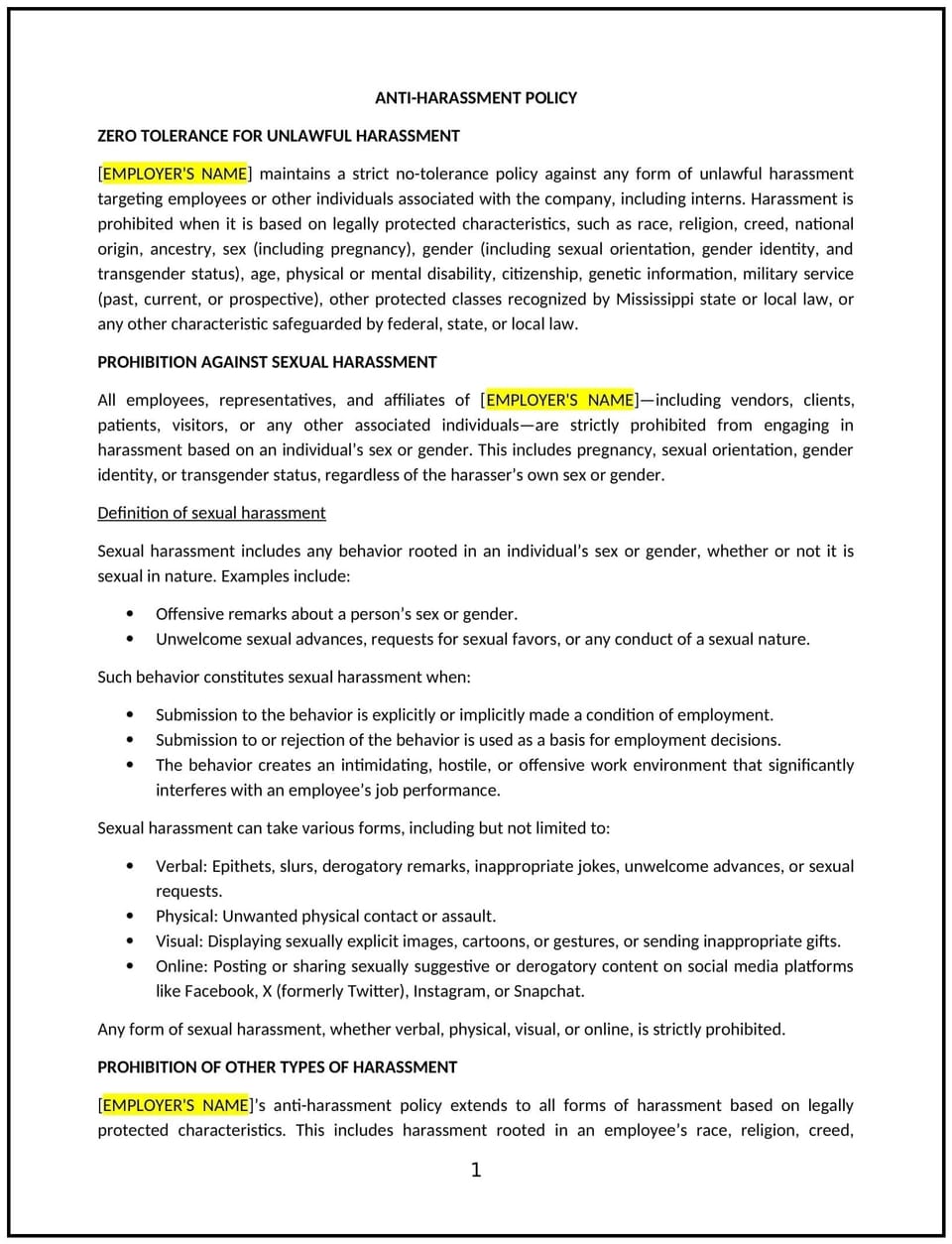Anti-harassment policy (Mississippi): Free template

Anti-harassment policy (Mississippi)
An anti-harassment policy helps Mississippi businesses establish a clear framework for preventing and addressing harassment in the workplace. This policy outlines the types of harassment, the company's commitment to maintaining a respectful work environment, and the steps employees can take if they experience or witness harassment.
By implementing this policy, businesses can create a safe and inclusive environment for all employees, reducing the risk of harassment claims and fostering a culture of mutual respect and professionalism.
How to use this anti-harassment policy (Mississippi)
- Define harassment: Clearly define what constitutes harassment in the workplace, including but not limited to sexual harassment, racial or ethnic harassment, bullying, and other forms of offensive conduct. Ensure that the definition is inclusive of all forms of harassment that could potentially occur in the workplace.
- Establish reporting procedures: Outline how employees can report incidents of harassment, including the use of a designated reporting point (e.g., HR, management) and any confidential reporting options available. Make sure employees understand that they can report harassment without fear of retaliation.
- Investigate complaints: Describe the process for investigating harassment claims, including the steps taken to maintain confidentiality, the timeline for investigations, and the consequences for found violations.
- Promote prevention: Encourage proactive measures to prevent harassment, such as regular training, fostering awareness, and promoting positive workplace behavior through clear codes of conduct and workplace expectations.
- Outline disciplinary actions: Specify the potential consequences for employees who engage in harassment, which may range from warnings to termination depending on the severity of the incident.
- Encourage respect and inclusivity: Reinforce the company's commitment to creating an environment where all employees are treated with respect and dignity, regardless of their background, gender, or personal characteristics.
- Review and update: Regularly review the policy and its effectiveness, making adjustments as necessary to ensure that it continues to meet the needs of the workplace and reflects any changes in applicable laws.
Benefits of using this anti-harassment policy (Mississippi)
This policy provides several benefits for Mississippi businesses:
- Protects employees from harm: A comprehensive anti-harassment policy protects employees from offensive behavior, harassment, and discrimination, creating a safer and more supportive work environment.
- Promotes a respectful workplace: By addressing harassment, the policy fosters a culture of respect and inclusion, where employees feel valued and safe.
- Reduces legal and financial risk: Implementing an anti-harassment policy can help businesses reduce the risk of costly harassment claims and lawsuits by ensuring that complaints are addressed promptly and appropriately.
- Enhances employee morale: Employees who feel that their workplace is free of harassment are more likely to be engaged, productive, and satisfied with their jobs.
- Demonstrates commitment to DEI: A strong anti-harassment policy supports diversity, equity, and inclusion (DEI) initiatives by ensuring that all employees are treated fairly and with respect.
Tips for using this anti-harassment policy (Mississippi)
- Communicate the policy effectively: Make sure all employees are familiar with the policy, how to report harassment, and the company’s commitment to addressing concerns.
- Provide training: Regularly conduct training on harassment prevention and respectful workplace behavior for employees at all levels.
- Encourage open communication: Create a culture where employees feel comfortable discussing harassment and workplace concerns without fear of retaliation.
- Investigate complaints thoroughly: Ensure that all complaints are investigated fairly and promptly, with appropriate confidentiality and impartiality.
- Take action when necessary: Follow through on the policy by taking appropriate disciplinary action when harassment is confirmed.
Q: Why should Mississippi businesses have an anti-harassment policy?
A: An anti-harassment policy helps create a safe and respectful workplace by preventing and addressing harassment, reducing the risk of legal issues, and fostering a positive company culture.
Q: What types of harassment are covered by this policy?
A: The policy should cover all types of harassment, including sexual harassment, racial or ethnic harassment, bullying, verbal abuse, and any conduct that creates a hostile work environment.
Q: How should employees report harassment?
A: Employees should report harassment through designated reporting channels, such as HR, a manager, or a confidential hotline. The policy should ensure that reports are handled professionally, confidentially, and without retaliation.
Q: What happens if an employee is found guilty of harassment?
A: Employees found guilty of harassment may face disciplinary action, which could range from warnings to suspension or termination, depending on the severity of the violation.
Q: How can businesses prevent harassment in the workplace?
A: Businesses can prevent harassment by implementing regular training programs, promoting respectful behavior, setting clear expectations for workplace conduct, and encouraging open communication.
Q: Are employees protected from retaliation if they report harassment?
A: Yes, the policy should include non-retaliation provisions to protect employees who report harassment in good faith. Employees should not face retaliation for speaking up about misconduct.
Q: How should the company handle anonymous harassment complaints?
A: The company should treat anonymous complaints with the same level of seriousness as non-anonymous ones, ensuring confidentiality while investigating the matter thoroughly.
Q: Can the policy be updated if new forms of harassment emerge?
A: Yes, the policy should be reviewed regularly and updated to address any new forms of harassment or changes in laws to remain relevant and effective.
Q: How can businesses encourage employees to report harassment?
A: Businesses should foster a culture of openness and trust by ensuring that reporting channels are accessible, confidential, and free from retaliation.
Q: How often should employees receive anti-harassment training?
A: Anti-harassment training should be provided to employees regularly, at least once a year, or whenever new policies, laws, or procedures are introduced.
This article contains general legal information and does not contain legal advice. Cobrief is not a law firm or a substitute for an attorney or law firm. The law is complex and changes often. For legal advice, please ask a lawyer.


